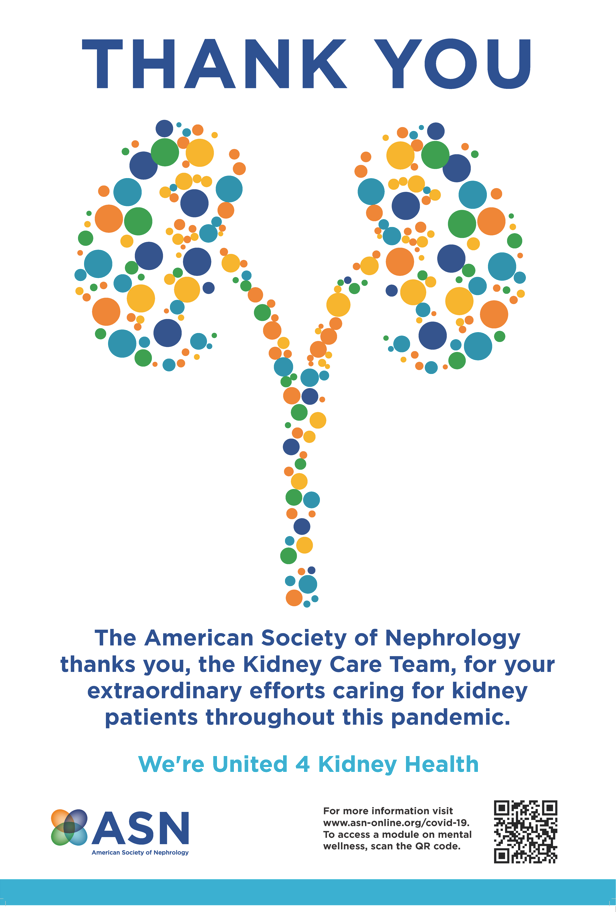
Dear Kidney Community Colleagues
During the COVID-19 pandemic, the kidney community has demonstrated unparalleled crisis leadership, creating new protocols and approaches to manage COVID-positive patients, adapting to equipment and supply shortages (often through innovative and resourceful methods), and providing continuous care through unprecedented staffing shortages.
The resourcefulness, strength and grace with which you have confronted all these challenges, often while managing personal and family trials, is without compare. While all health professionals have been tasked like never before, caring for patients with kidney diseases has been one of the most challenging, and your efforts have undoubtedly saved thousands.
For all that you have done for the patients in your care, in times none of us foresaw nor could have imagined, the American Society of Nephrology (ASN) extends its heartfelt thanks, gratitude, and recognition. As a small token of our appreciation, we have mailed the poster to the left that we hope you will display in a public area. The ASN leadership, COVID-19 Response Team, staff, and I will always remember your extraordinary efforts to care for patients throughout this difficult time.
If your team is interested in additional information to help you navigate through the remainder of the pandemic, I encourage you to consult the resources shared below.
On behalf of ASN, thank you, and best wishes for ongoing health and safety for your staff and patients.
Sincerely,
Susan E. Quaggin, MD, FASN
President
ASN Resources:
- COVID-19 Information-this is the main ASN COVID-19 information page. From this page, multiple resources are available from CDC, CMS, and other organizations and includes publications and information on monoclonal antibodies and vaccines.
- COVID-19 Toolkit for Nephrology Clinicians: Preparing for a Surge-in response to the increasing COVID-19 spread across the United States, the ASN COVID-19 Response Team has curated recommendations developed by nephrologists and nephrology team members which are focused across the nephrology care settings, including outpatient dialysis, dialysis in the acute care setting, urgent start peritoneal dialysis, home dialysis and the care of the patient with a kidney transplant.
- Mental Wellness Module-the impact of COVID-19 on all of us has been profound. For many healthcare personnel, compassion fatigue became a reality. In pursuit of wellness
CDC Resources:
- CDC-Omicron Variant: What you Need to Know-this page provides information on the COVID-19 Omicron variant; this page will be updated by CDC as new information is released.
- CDC: COVID Data Tracker-CDC began collecting weekly vaccination data, reported voluntarily through the Dialysis COVID-19 Module on March 11, 2021. This page displays data at the national and state level on COVID-19 vaccination coverage among patients and staff of dialysis facilities. These summaries represent data that dialysis facilities reported to the NHSN Dialysis COVID-19 Module using weekly vaccination forms.
- CDC: Key Things to Know About COVID-19 Vaccines-This page provides key points to know about the COVID-19 vaccines.
- CDC: COVID-19 Vaccines for Moderately or Severely Immunocompromised People-CDC provides a summary of COVID-19 vaccine options for people who are moderately or severely immunocompromised, including a table providing information for an additional primary and booster shots.
- CDC: Interim Guidance for Managing Healthcare Personnel with SARS-CoV-2 Infection or Exposure to SARS-CoV-2-this interim guidance is intended to assist in determining the duration of restrictions from the workplace for healthcare personnel (HPC) and provides an assessment of risk and application of workplace restrictions for asymptomatic HPC with exposure to SARS-CoV-2, including during the surge from the Omicron variant.
- CDC: Strategies to Mitigate Healthcare Personnel Staffing Shortages-guidance found on this page provides information on strategies to mitigate healthcare personnel staffing shortages due to the COVID-19 pandemic, including during the surge from the Omicron variant.
- What We Know About Quarantine and Isolation-information regarding current isolation and quarantine recommendations for the GENERAL population, not applicable to personnel in the healthcare setting.
- CDC: Quarantine and Isolation-on this page you will find information regarding steps to take for quarantine and isolation.
- CDC: What to Do If You Are Sick-this link provides steps to help prevent the spread of COVID-19 if you are sick, as CDC guidance is updated, CDC will update this information.
Other Resources:
- State Emergency Management Agencies (usa.gov)-this website provides access to each state Emergency Management Agency webpage and contact information for each office.
- FEMA – regional map-the Federal Emergency Management Agency (FEMA) consists of ten regions in the continental United States and territories. This webpage provides access to each of the ten FEMA regions and states in each of the regions.
- FEMA – How a Disaster Gets Declared– this page provides procedural information regarding the Stafford Act declaration process and is intended for emergency managers, elected officials, media, and stakeholders interested in the formal declaration process. All emergency and major disaster declarations are made solely at the discretion of the President of the United States.

